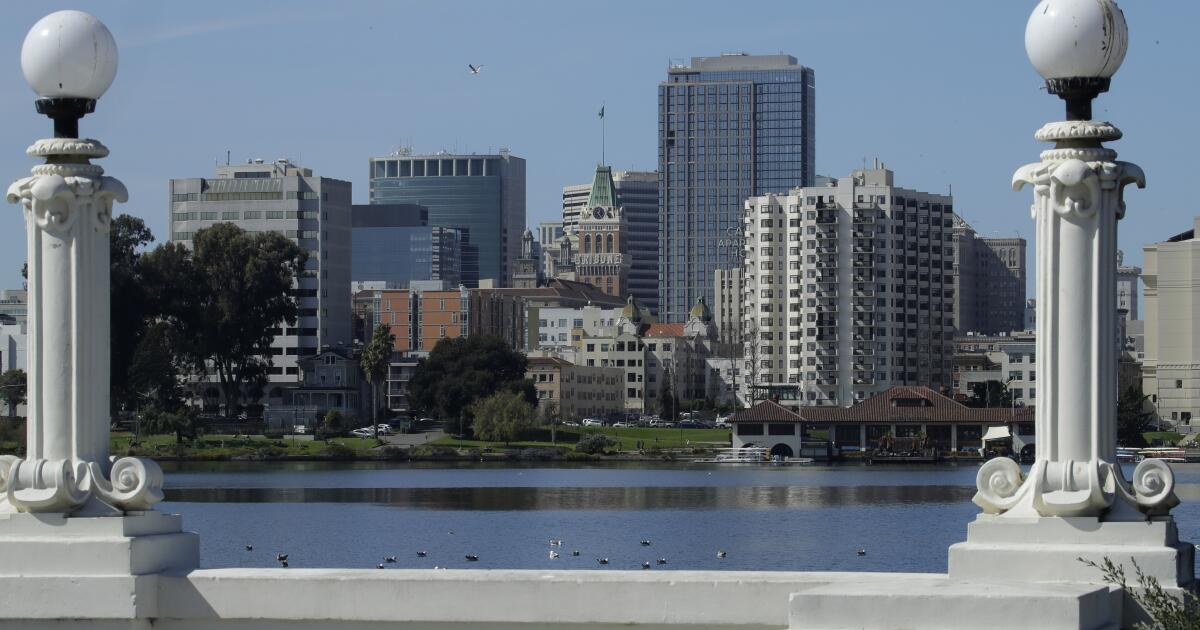
Throughout 2023 and rolling into last year, this city on the east end of the Bay Bridge found itself where it’s often been — downcast and written off. A crime wave swept the city, even creeping into its tonier northern neighborhoods. High-profile chains like In-N-Out Burger and Denny’s closed outlets, saying Oakland had become too dangerous.
Voters recalled both the mayor and the district attorney of Alameda County last year. And the civic mood turned even darker at the start of 2025, when federal officials indicted former Oakland Mayor Sheng Thao on charges of corruption.
Though Oakland continues to struggle to find enough police to patrol its streets, to deal with homelessness and to deliver services, a random sampling this week found residents mostly optimistic that things may be getting a bit better. Several told The Times that they think the most brazen crimes — including car break-ins that had been epidemic — have become less common. The police department recently announced a 28% drop in crime (despite President Trump’s claims to the contrary) for the first six months of the year.
Locals said they were hopeful that a new mayor, longtime congresswoman Barbara Lee, will be able to deliver much-needed housing, social services and an expanded police force, which eluded her predecessors.
“Two years ago it seemed like every day you would hear about 10 cars being broken into. Every day!” said one downtown hotel worker, who asked to remain anonymous, for fear he would anger his employer. “It’s slowed down a lot. It’s gotten better.”
But the bellman still warns guests not to leave anything in their cars less they fall victim to a preferred East Bay crime known as “bipping.” That’s when a thief breaks a car window to steal what’s inside.
As in many other big cities, Oakland leaders are trying to fund high-price priorities, particularly bolstering the understaffed Police Department, while also paying for the kind of social programs that many folks in liberal Oakland believe are key to keeping young people occupied and out of trouble.
Mayor Lee said in an interview that she’s juggling all those priorities, trying to bolster the police, while making sure they are accountable, after past incidents of excessive force alienated many in the city’s non-white majority. “Accountability and safety go hand in hand,” she said.
President Trump recently dismissed Oakland as “so far gone.” Lee responded: “When he trashes Oakland, you have to resist that. When he threatens to send the military in to occupy Oakland, you must speak out. And we’re saying, ‘If you want to help our cities, send our tax dollars back to us for violence prevention … so we can hire more police officers … so we can address the underlying causes of some of this crime, in terms of jobs and in terms of education. And stop attempting to dismantle our democracy, because here in Oakland, it’s the power of the people, and we believe in democracy.’”
The city’s challenging conditions come close on the heels of a promising recent past. The Oakland economy had grown in the previous decade, with an infusion of tech and other investment. A food and culture scene blossomed downtown, offering a hip, cheaper alternative to San Francisco.
But good times began to fade in 2020 with the COVID-19 pandemic. Restaurants, bars and other businesses began to close down and the city’s upswing began to fade. So did the city’s finances. A Police Department that stood at 749 officers in 2019 has declined to 511 officers.
Voters in November overwhelmingly approved a property tax increase to pay for more police and fire service. But recruitment continues to lag. Councilmember Charlene Wang this week joined with the NAACP, faith and community leaders, all urging more people to apply to the Police Department.
Accommodating a large population of homeless people remains a hot issue, with the City Council last week debating whether it’s right to clear encampments even if people living in them don’t have alternative homes. After a seven-hour meeting, the council sent the matter to committee for more study.
In Oakland, a town where the Black Panther Party once provided meals and other services, many locals are demanding more programs to help young people. “Right now there’s a lot of vaping and gaming,” said Mike Jenkins, who runs the Lift Us Foundation, teaching weight lifting and discipline to young people. “We need to do more for the kids of Oakland.”
Kara Villanueva, owner of the downtown Oakland Street Food Co., said her business is hanging on, hoping for a rebirth of the pre-pandemic salad days.
“It’s been hard,” Villanueva said, “but we’re hoping to bring some of that momentum back.”
Today’s top stories
A former DACA recipient died in ICE custody. Did officials ignore his pleas for help?
Ismael Ayala-Uribe, 39, was pronounced dead on Sunday after being held at an ICE facility in Adelanto.
He is the 14th person to die in immigration detention since January, when federal immigration officials began to carry out President Trump’s mass deportation agenda.
News of Ayala-Uribe’s death comes amid intense scrutiny of immigration facilities as the Trump administration ramps up deportations.
Mystery deepens into Celeste Rivas Hernandez’s death as authorities release her body
The teenage girl who was found dead in the front trunk of a Tesla in a Hollywood tow yard is finally going home after the medical examiner’s office released her body to her family on Wednesday.
How her body wound up in the trunk of a multiplatinum musician’s vehicle while he is in the middle of a world tour remains a mystery, and has thrown into question the remaining tour dates and fueled rumors about his potential relationship with the girl, who was reported missing last year.
RFK Jr. wants an answer to rising autism rates. Scientists say he’s ignoring some obvious ones
This week, the Trump administration announced that it was taking “bold action” to address the “epidemic” of autism spectrum disorder — starting with a new safety label on Tylenol and other acetaminophen products that suggests a link to autism.
The scientific evidence for doing so is weak, researchers said.
Experts say that it’s most likely due to the expansion of autism diagnostic criteria since the 1980s, encompassing a much broader range of behaviors and developmental differences.
More big stories
Millions of Californians are getting a refund on their electric bill. Here’s what you need to know.
Orange County wants to know: Are any dogs or cats registered to vote?
What social media got wrong about the ICE raids of the Santa Fe Springs Swap Meet.
Loud TV commercials drive viewers crazy. California wants to quiet them down.
After 56 years on air, a California TV station abruptly shutters news operations.
2026 Oscar predictions: Our BuzzMeter panel picks the front-runners in 10 major categories.
Trump’s campaign against wind and solar is exposing his “energy dominance” lies, argues columnist Sammy Roth.
Dear FCC: Jesse Watters just suggested “blowing up” the U.N., news and culture critic Lorraine Ali writes.
Religious revolution is happening online (and that’s not a bad thing), writes guest columnist Reza Aslan.
This morning’s must read
Oher great reads
After ICE raids, this Venezuelan mom fled from L.A. to Mexico. Will she find refuge there?
How L.A.’s king of super chuggers polarizing natural wines have become fixtures at top L.A. restaurants.
For your downtime
Going out
Art: It’s a horse, it’s a dinosaur: An exclusive peek at Jeff Koons’ monumental sculpture at LACMA.
Tours: The “Brady Bunch” house will finally open its doors to the public — for three days only.
Theater: Boston Court’s rare Tennessee Williams revival rises to the moment, plus more notable small theater reviews.
Staying in
Television: In Netflix’s new series “Wayward,” Mae Martin takes their modern-day Peter Pan persona deep into a dark thriller.
Recipes: Here’s a recipe for easy apple cake.
✏️ Get our free daily crossword puzzle, sudoku, word search and jigsaw games.
And finally … from our archives
On Sept. 25, 1890, President Benjamin Harrison signed legislation establishing the second national park in America — Sequoia National Park.
More than 100 years later, one of California’s most treasured parks is threatened by blight caused by pollution and climate change. In a report from last year, The Times’ Lila Seidman wrote about how the four national parks with the highest ozone levels are all in California, with Sequoia and Kings Canyon topping the list.
Have a great day, from the Essential California team
Jim Rainey, staff reporter
Hugo Martín, assistant editor, fast break desk
Kevinisha Walker, multiplatform editor
Andrew Campa, weekend writer
Karim Doumar, head of newsletters



